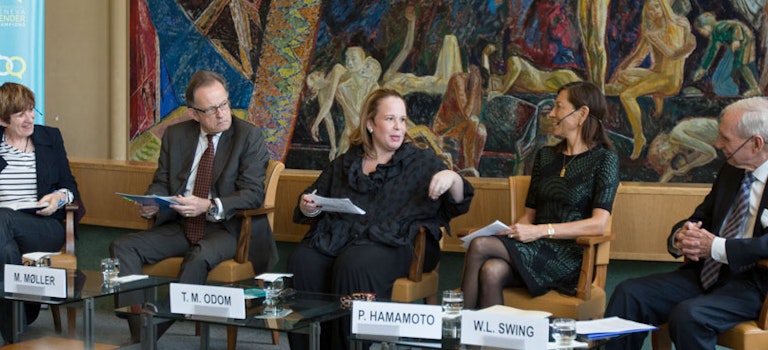Following the commitment of U.N. High Commissioner for Human Rights Zeid Ra’ad Al Hussein to become a Geneva Gender Champion, OHCHR leadership tackles gender stereotypes and unconscious bias as human rights violations.
Kate Gilmore, Deputy High Commissioner for Human Rights, remembers the first time she was directly confronted with gender inequality in her work.
She was in her 20s, and had taken on a job in a drug and alcohol rehabilitation centre in her native Australia. Everything she began to realise in the centre was geared toward men, she said. Men ran the programmes; men ran the centre. All the rehabilitative activity were geared around male forms of working and exercising. Nothing made concessions to the fact that women drank in different ways, had different patterns of drug abuse, might therefore need other ways to access and receive help. Gilmore had read about gender inequality at university, but to see it living and breathing all around her, facilitated by a public service that admitted women as residents, she “smelled a rat.”
“The pain in those women, as they were struggling to overcome their addictions, being unrecognized in what it meant for them as mothers, wives, as daughters and how different it was for men as fathers, husbands, sons, I’ll never forget that. That was more powerful a point of change than any university degree I ever received.”
 Gilmore said that experience and others like it help to guide her in her work to ensure that people are not treated differently simply because of “who they are born to be and the way the world then judges who you are.” She is one of four Gender Champions who will be taking part in a discussion on tackling invisible gender bias during an event for International Women’s Day. The discussion looks at how unconscious bias affects women’s lives and human rights.
Gilmore said that experience and others like it help to guide her in her work to ensure that people are not treated differently simply because of “who they are born to be and the way the world then judges who you are.” She is one of four Gender Champions who will be taking part in a discussion on tackling invisible gender bias during an event for International Women’s Day. The discussion looks at how unconscious bias affects women’s lives and human rights.
The Human Rights Office promotes gender equality as a fundamental human right. “Biases and stereotypes become harmful when they limit people’s choices and when they impact on the realization of their rights,” said Veronica Birga, who heads the Gender and Women’s Human Rights section. Take the example of the seemingly benign stereotype that women are more nurturing than men. It is a stereotype that contributes to the burden of child caring being disproportionally placed on women, affecting their professional life”. She added. The Office has undertaken work studies to show the many ways in which stereotypes can negatively affect women’s rights and what are the States’ obligations in this regard.
Unconscious biases are the blind spots we all have, where we make implicit connections about people and situations, said Tanya Odom, a consultant who has studied the phenomenon and will moderate the discussion for Women’s Day. It is a map that we have at a subconscious level, formed by numerous factors such as life experiences, cultural upbringing, societal expectations, even media. These biases can be positive or negati
“It is scary,” she said. “But it also allows people to see themselves in not a bad light. One piece of research suggests that people can consciously believe in equality but can act on this subconscious bias and act in ways contrary to that.”
So how do you combat something that is so deeply ingrained? Odom said the key is awareness and action. You can become aware of hidden biases through any number of tests available online (such at the implicit association test). And once aware of these biases work to counter them, she said.
“You have to expose yourself to counter-stereotypical images,” Odom said. “So if you want more women in leadership positions, you need to see women in those positions.”
Birga says the Office has worked with judicial schools in several countries to identify and address stereotypes about women that can compromise judges’ impartiality and result into a miscarriage of justice, particularly in cases related to sexual and gender-based violence. 
One way to counter stereotypical images is the Geneva Gender Champion Initiative. The initiative, which was launched last year, saw the High Commissioner for Human Rights and others pledging, inter alia, not to participate in any official panels where there are no women. Odom and Gilmore want this pledge to move beyond UN officials to the private sector and to include panels to be more diverse on racial and geographical ways.
“Our internal maps are one of the gravest barriers to change and an element of the internal map tells us that things cannot change, that we cannot make a difference,” Gilmore said. “That is not true. We can all make a difference. The sort of difference we all can make is in ourselves – first and foremost - intimate and personal change, and that is where change truly begins.”
- See more at: http://www.ohchr.org/EN/NewsEvents/Pages/ChangingOurSubconscious.aspx#sthash.HqufUz76.dpuf
